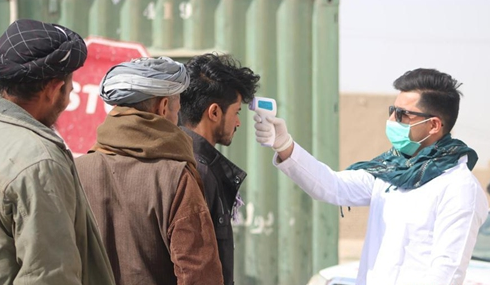
A health official checks a passenger's body temperature at a traveler screening point in Shiberghan city, capital of Jawzjan province, Afghanistan, March 15, 2020. (Photo: Xinhua)
Located 15 kilometers east of Herat City, on the hillside of Shayedaye Mountain is the Shayedaye Hospital, where 100 beds are available to people suffering from COVID-19. Shayedaye Hospital was initially built to treat people addicted to narcotics, and then partially used to care for sick children. It's a rudimentary health facility.
The first confirmed case of COVID-19 in Afghanistan was recorded in Herat on February 24, who was an Afghan returnee from Iran. With the spread of virus in Iran, up to 15,000 Afghans are flowing every day into three border provinces of Herat, Farah and Nimroz.
The returnees come from all over Afghanistan and so the number of confirmed cases, which is now registered at more than 30, have been recorded in different provinces of Afghanistan.
No quarantine sights have been prepared for returnees, who are living with their families and mingling with villagers. Secrecy, fear of being hospitalized, and very basic medical treatments are threatening tens of thousands of Afghans.
The situation in Kabul, capital of Afghanistan, is no better than in Herat. In Kabul, only one diagnostic center has the capacity to check only about 50 people a day, and results aren't known for up to 48 hours.
Conditions in hospitals are terrible. It was reported that some 40 people suspected of being infected simply left the Shayedaye Hospital and have disappeared. Furthermore, people who have been quarantined and hospitalized complain of poor condition and treatment facilities at the hospitals.
The coronavirus is not the only threat to the Afghan people. Afghanistan's consumer market is dependent on foreign goods and after the first case of coronavirus was disclosed food price rose 25 percent overnight and disinfectants sold out. The available masks are sold at five times of their normal price. In a country of more than 30 million people, only 60,000 masks are being produced daily.
Security problems, peace talks with the Taliban and establishing a new government mean fighting COVID-19 has not been a priority for the country.
China is the only country that is ready to help Afghanistan. Afghanistan's allies and neighboring countries have not yet responded with offers to help Afghanistan through this new tragedy. The Afghan government has pledged only $15 million to virus control. This amounts to 40 cent per Afghan, compared to $193 being spent per person in the US.
Our neighbors are watching the outbreak of COVID-19 in Afghanistan, concerned about it spreading to their own countries. Afghanistan has proposed a cooperation mechanism for Afghanistan-Central Asia to fight the virus, including knowledge exchange and the flow of needed goods.
The most successful experience has been China's. China has contained the virus with tremendous effort and an unbelievable amount of human and material resources: 40,000 beds for patients, 70,000 for quarantine, and 32,000 doctors and nurses from all over China were sent to Wuhan. How can Afghanistan emulate this success with only $15 million, 1,000 beds and 1,200 doctors for a population of just over 30 million?
Afghanistan's international allies, who spent billions of dollars a year for years to manage a war, have not yet responded to this health tragedy in Afghanistan.
If the situation continues, Afghanistan will likely face a staggering death toll caused by the coronavirus outbreak.
We believe friends support each other through difficult times and such support remains in people's memories, as their hearts are filled with love.
During this difficult time, Afghanistan is turning to China for help, and is expecting urgent assistant to help fighting the likely uncontrolled spread of the coronavirus.


